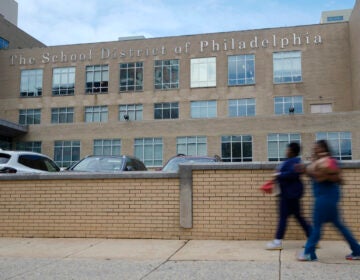Lessons from teachers — Delving into the impact of music
Johnny Oliver has no doubt about the best unit that he’s taught – and is still teaching – at Freire Charter School.
It’s on radio, recording, and music. Every year students mark it on their teacher evaluations as the most popular project.
As a result of the big changes underway in the Philadelphia School District, teachers will soon be given more freedom to be creative. As part three of five, the Notebook and NewsWorks took a multimedia look inside the classrooms of exemplary Philadelphia teachers to get an on-the-ground perspectives of great teaching.
Johnny Oliver has no doubt about the best unit that he’s taught – and is still teaching – at Freire Charter School.
It’s on radio, recording, and music. Every year students mark it on their teacher evaluations as the most popular project.
Oliver, too is popular. Known as “Mr. Johnny,” he could almost be mistaken for a student. In the small basement computer lab, he sports jeans, a casual shirt, black-rimmed glasses, and a neatly manicured goatee. But once he stands in front of the smart board, summoning a student up to the lectern, it’s clear he’s in charge.
Oliver, 38, has been at the Center City high school for the past 13 years. A former reporter for the Gannett News Service, he first started teaching a class in journalism. Today, he teaches mass communications to 12th graders and engages them using a strategy he said is pretty straightforward.
“If I can hook them to a particular topic, then it is my belief that it will get them to buy in with doing the real work, the skill-based work,” said Oliver, who holds a master’s in education from Temple University.
For this particular unit, Oliver wanted students to write a critical response paper about how particular media affect “how we feel, think and act.” He chose to focus on music because “I see how it impacts young people’s behavior, how they see themselves, and how they see others.
“So, I started off by getting kids to come in with a piece of music. They have to play the music, then state whether they would have this played at their wedding, graduation, funeral, or when their first child is born.”
That first step got students into a dialogue about the music’s impact. Oliver said they opened up in a way that they had never done before, sharing personal reflections. And they were eager to proceed with the unit, which included extensive reading about the history of radio, music and recording, federal regulations, and FCC guidelines.
“I get feedback from students in the hallways, 10th and 11th graders, who ask me ‘What are your students doing in your class because they always seem so hype?”
Oliver said the school supports this unit – which he teaches each year – and that he doesn’t feel constrained by mandates. But then, that’s how it’s been since day one.
“One of the things the folks who started Freire decided was that they wanted teachers to have autonomy. We were trying to break away from the bureaucracy of education,” he said.
“So now, we look at state standards and work toward meeting those standards for each grade level. But how we get there is where the freedom comes in.”
WHYY is your source for fact-based, in-depth journalism and information. As a nonprofit organization, we rely on financial support from readers like you. Please give today.




